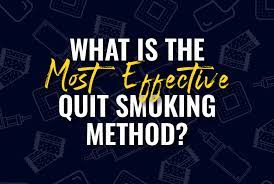Understanding the Journey to Quit Smoking
The Challenge of Quitting Smoking
Quitting smoking is a journey that millions of people embark on every year, but it’s not without its challenges. Nicotine addiction, habitual behaviors, and withdrawal symptoms can make it difficult for smokers to break free from their dependence on cigarettes. However, with determination, support, and the right strategies, it is possible to overcome these obstacles and achieve success in quitting smoking.
Exploring Effective Quit Smoking Methods
Nicotine Replacement Therapy (NRT)
Nicotine replacement therapy (NRT) is a popular quit smoking method that helps reduce withdrawal symptoms by providing the body with a controlled dose of nicotine. NRT products such as patches, gum, lozenges, and inhalers can help ease cravings and gradually wean smokers off nicotine. NRT is available over-the-counter and is often recommended as a first-line treatment for quitting smoking.
Prescription Medications
Prescription medications such as varenicline (Chantix) and bupropion (Zyban) are another effective option for quitting smoking. These medications work by targeting the brain’s nicotine receptors, reducing cravings and withdrawal symptoms. While they may have side effects, they can significantly increase the likelihood of successfully quitting smoking when used as directed under medical supervision.
Behavioral Therapy
Behavioral therapy focuses on changing the thoughts, feelings, and behaviors associated with smoking. Techniques such as cognitive-behavioral therapy (CBT), counseling, and support groups help smokers identify triggers, develop coping strategies, and build resilience to cravings. Behavioral therapy can be conducted individually or in group settings and can provide valuable support and encouragement throughout the quitting process.
Combination Therapy
Combining multiple quit smoking methods, such as NRT with behavioral therapy or prescription medications with counseling, can significantly improve the chances of success. By addressing both the physical and psychological aspects of nicotine addiction, combination therapy offers a comprehensive approach to quitting smoking and provides additional support and resources for long-term success.
Choosing the Right Method for You
Personalized Approach
There is no one-size-fits-all approach to quitting smoking, as each individual’s journey is unique. It’s essential to explore different quit smoking methods, consider your preferences, lifestyle, and medical history, and consult with a healthcare professional to determine the most effective strategy for you. Whether you choose NRT, prescription medications, behavioral therapy, or a combination of methods, finding the right approach that resonates with you is key to achieving success in quitting smoking.
Conclusion
Quitting smoking is a challenging but achievable goal with the right support and resources. By exploring effective quit smoking methods such as nicotine replacement therapy, prescription medications, behavioral therapy, and combination therapy, smokers can increase their chances of success and improve their overall health and well-being. Remember, quitting smoking is a journey, and every step forward brings you closer to a smoke-free life.




